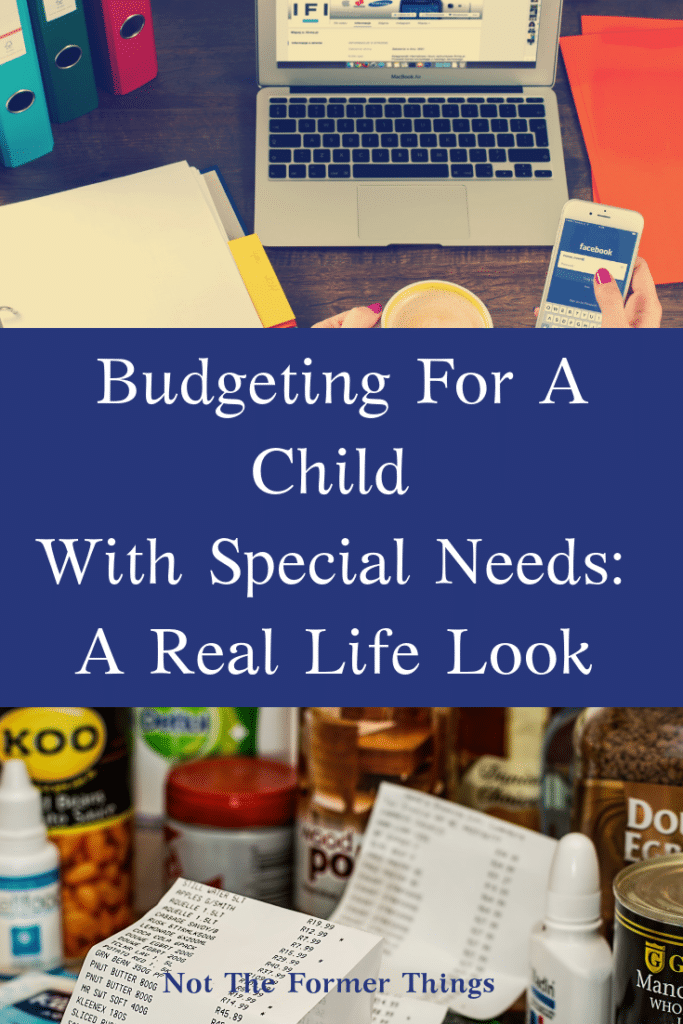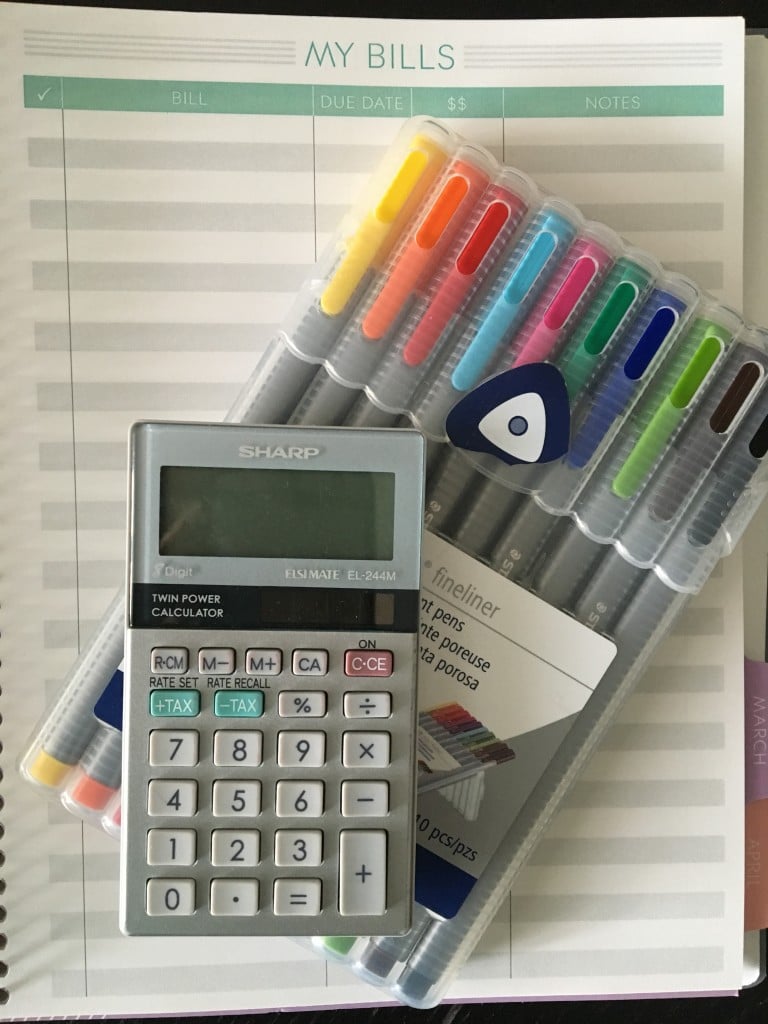Budgeting For A Child With Special Needs: A Real Life Look
This post, Budgeting For A Child With Special Needs: A Real Life Look, was first published here on Not The Former Things in 2015. Although our budget has changed some since then, our approach to budgeting (and the guilt I often feel over how we are spending related to my boys) has remained essentially the same. The only thing we have added is a line item in our budget to save for future hospital stays, hoping we won’t need it, but wanting to be prepared just the same.
I know many of you are in the same position and struggling to figure out the real life, financial implications of parenting a child with special needs. Please know, this is not intended to be financial advice, but instead, a glimpse into another family’s approach.
It has become clear over the course of the last six months, that we need to think a little differently about our budget.
My son’s recent additional diagnosis, means that he will likely need care, far beyond the age of 18. When I am most honest with myself, I recognize he will likely need some sort of assistance long past my own lifetime.
The reality of his autism diagnosis combined with a chronic autoimmune disease is sinking in, and all of a sudden, long-term savings has become a very, very big deal.
As part of managing our monthly budget with an even greater emphasis on long-term care, we have been asking a lot of questions.
How can we help my son be as independent as possible?
What support will he need in that (both financially and personally)?
Should we start considering only one level homes to eliminate the need for climbing stairs (something that will likely be more and more difficult for him as time moves on)?
Is there even any room in our already stretched so thin budget to put more away in savings?
Budgeting For A Child With Special Needs
It is a lot.
It is a lot to think through, and at the same time, try to ignore my momma’s heart aching for him and his future.
It is a lot to think through, and at the same time, also try to make the day-to-day money decisions that keep us sane.
Decisions like…
I know I promised him a new filter for the aquarium, but we could be putting that money away for his future.
There is no way I can buy him the expensive bottle of water, even if it is the only one he will drink with his sensory issues (he can tell the difference, trust me).
If he melts down and breaks his device again, paying to fix it will mean less for the future.
Should we scale back on some therapies now, to help save for a more long-term solution?
I have been putting a ton of pressure on myself to figure this out. And for the most part, I think it is good that we are thinking about it now, instead of when we really need it.
But the stress of worrying about the future takes its toll. It makes me forget that today is here too, and it matters.
As part of trying to figure all of this out, I have been listening to Dave Ramsey on my podcast app when I drive to Target. He reminds me to keep my eye on the prize. It helps me feel better about walking away from that new vacuum I have been eyeing and is now on sale, or the cute little bathroom rug, or the darling owls that I have no business buying.
Having Dave’s voice in my ear reminds me that none of those things matter as much as my son’s care.
A Real Life Look At Budgeting For A Child’s Special Needs
Today, I went to go and pick up a few things. When I turned on the podcast, I heard a caller asking Dave about his spending money to buy fun things for his grandson with significant special needs. He said that his grandson has it tough, both physically and emotionally, and he wants to make his life a little brighter.
I leaned forward, certain Dave was going to say the caller was spoiling the child, and no way should he be paying so much a month to have fun with a 14-year-old kid.
Instead, he lovingly and graciously said, “As long as you budget for it and are not going into debt to do it, I think you should spend as much as you can on that boy. If it’s $200.00, then it’s $200. If it’s $500.00, then it’s $500. Just set your budget and then don’t feel bad about it.”
I was starting to tear up in pure relief as he finished up with this –
“Using your money to care for a child is just about the best use of money I can imagine. I mean, I am not sure there is a greater calling or better way to use the money you have been given.”
I began to sob.

I had been beating myself up for spending money on the things that make my son’s life better, in the hopes of controlling a future that is completely out of my control.
I had been making my son’s life more difficult today, because I fear how difficult his future will be.
It seems silly now as I type this, but there is no way to describe the immense burden that was lifted hearing that advice. (Thank you so much, Dave!)
Practically, it means we budget for the life we have been given. Yes, that includes long-term planning, but it also means accepting that a large percentage of our income will go towards today’s medical bills and therapies.
It means we set aside money in our budget for things like aquarium parts and computer builds without guilt, because we know it brings him joy and allows him to better interact with the world around him.
It means we pray for wisdom and the ability to be good stewards of both the money, and the children God has entrusted to our care.
It means, more than anything else, that we trust God will provide what we need, exactly when we need it.
He always has. He promises that he always will.
I can’t imagine anything better as we plan care for my precious son.





This is beautiful. Thank you. I love your heart!
Wow. Thank you so much, Kristi! You made my night.
Thank you for sharing. Your openness to share your journey has touch my life so many times. Some days I feel like you are writing just because you know I will be reading. I am not super emotional but you make me feel all the emotions!
This is something that I think comes up every few months at our house. My husband is always the first to say that the little things that make our day to day more peaceful are worth it in the long run because they are not always such “little” things to us. I tend to feel extremely guilty for spending money on things that I know other people don’t have to think twice about because it won’t affect their lives the same way as it does ours. So, that yarn my husband insisted I buy because I wanted to learn to knit and it was softer than the cheaper yarn but would most definitely guarantee I would actually sit down to knit even if it was twice as much, is the sort of thing I am trying not to feel guilty about. Or that we spent money on coloring pencils for all three of us for homeschool because there is such a sense of pride to have your own coloring pencils and of course a new fancy coloring book that helps keep us focused when doing school has been totally worth it. (And they helped my little ones actually sit through a wedding this weekend without having to put on headphones!) By the way, we are three aspies (two kids – 8 boy, 9 girl -and myself) and my low functioning neurotypical husband (as he calls himself).
You described this so well. The feeling of guilt because it is so different from what other families spend their money or allow their kids – it can be intense and so defeating. Your hubby sounds awesome (and I love the low functioning neurotypical label… he should really patent that),and I am glad he is caring for you as you care for your little ones.
Thank you so much for sharing your wisdom and for your kind words!
Shawna
Not that I want to add to your budgeting woes, but a FB group I belong to posted this link today. It’s cellphone apps for special needs. While my main interest was the blind ones, they have autistic and dyslexic ones as well that I thought you might be interested in.
http://www.uksmobility.co.uk/blog/2015/10/45-powerful-mobile-apps-for-those-with-disabilities/
Tina
I Love this. Thank you for sharing!
I love Dave Ramsey as well! He has changed the way we view finances…we actually sold our house and downsized to get out of debt. Years of increasing medical costs and taking from our savings was so stressful that we decided that this was the best path to turn our finances around. Some people thought we were crazy but we truly believed God had a better plan for our finances.
Thank you for sharing Shawna.
We sound like we share similar circumstances! We have made the decision not to buy for right now for the same reason. Having a giant emergency fund vs. a down payment just makes more sense for our current expenses and possible future expenses.